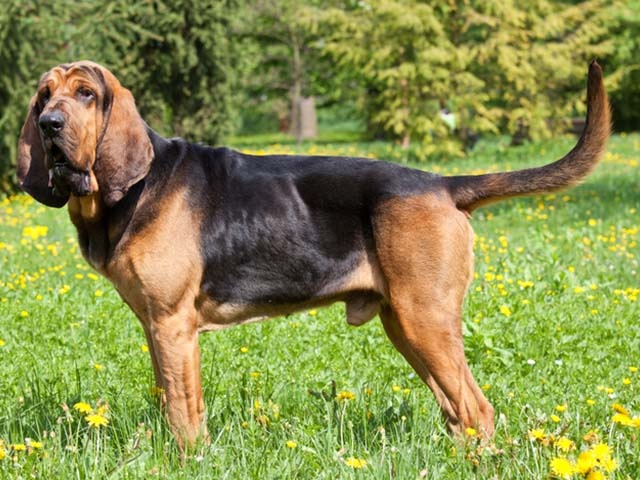
Bloodhound

Navigate through the tabs
Navigate through the tabs below to view the breed's info of your interest.
The breed's info is divided in four sections; namely:
the breed's history ,
the breed's main stats ,
the dog's potential health issues
and finally, how the breed scored in 26 different categories.
All the above information should give you a respectively good overview for the dog of your interest.
Dog Breed's Main Info
The Breed's History:
Descriptions of the desirable physical qualities of a hunting hound go back to Medieval books on hunting. All dogs used in the hunting field were gentle, that is of good breeding (not necessarily pure breeding), and parents were carefully chosen to maintain and improve conformation.
In 1896, making some use of wording found in earlier descriptions, Edwin Brough and Dr J Sidney Turner published Points and Characteristics of the Bloodhound or Sleuth-Hound. This was adopted by the newly formed Association of Bloodhound Breeders, and ultimately became, with very little change, the official breed standard of the KC and the AKC.
Meanwhile, the Belgian or Dutch Comte Henri de Bylandt, or H A graaf van Bylandt, published Races des Chiens in 1897, a huge and very important illustrated compilation of breed descriptions, or standards. In this French edition the Bloodhound appears as the Chien de St Hubert, although the pictures illustrating the standard are all of British Bloodhounds, many of them those of Edwin Brough.
The book was revised and reprinted in four languages in 1904, and in this edition the English text of the standard is that of the Association of Bloodhound Breeders, while the French text is closely based on it. However, the present FCI standard uses a quite different layout and wording. The AKC standard has hardly been altered from the original of 1896, the principal change being that the colours, black and tan, red and tan, and tawny, have been renamed as black and tan, liver and tan, and red, but the British KC has made considerable changes.
Some of these were simply matters of presentation and did not affect content. However, responding to the view that the requirements of some breed standards were potentially detrimental to the health or well-being of the animal, changes have been made affecting the required eye-shape and the loose skin, the most recent revision being 2008-9.
Country of Origin:
Belgium / France
Breed Group:
Hound
Height:
1 foot, 11 inch. to 2 feet, 3 inch. (58,42 to 68,58 cm)
Weight:
80 to 110 pounds (36,29 to 49,90 Kg)
Life Span:
11 to 15 years
Potential Health Issues:
Fold Dermatitis,
Gastric Dilatation-Volvulus (Bloat),
Epilepsy,
Ectropion,
Entropion,
Elbow Dysplasia,
Hypothyroidism,
Hip Dysplasia
Adaptability
Apartment Living:
First Time Owners:
Sensitivity:
Being Alone:
Cold Weather:
Hot Weather:
Friendliness
Affection With Family:
With Kids:
With Dogs:
With Strangers:
Health and Grooming
Shedding:
Drooling:
Easy To Groom:
Overall Health:
Weight Gain Potential:
Size:
Training
Easiness:
Intelligence:
Mouthiness:
Prey Drive:
Barking or Howling:
Wanderlust:
Need For Exercise
Energy Level:
Intensity:
Exercise Needs:
Playfulness:
Our Mobile Application
Check out Our Mobile Application "Dog Breeds Central"
